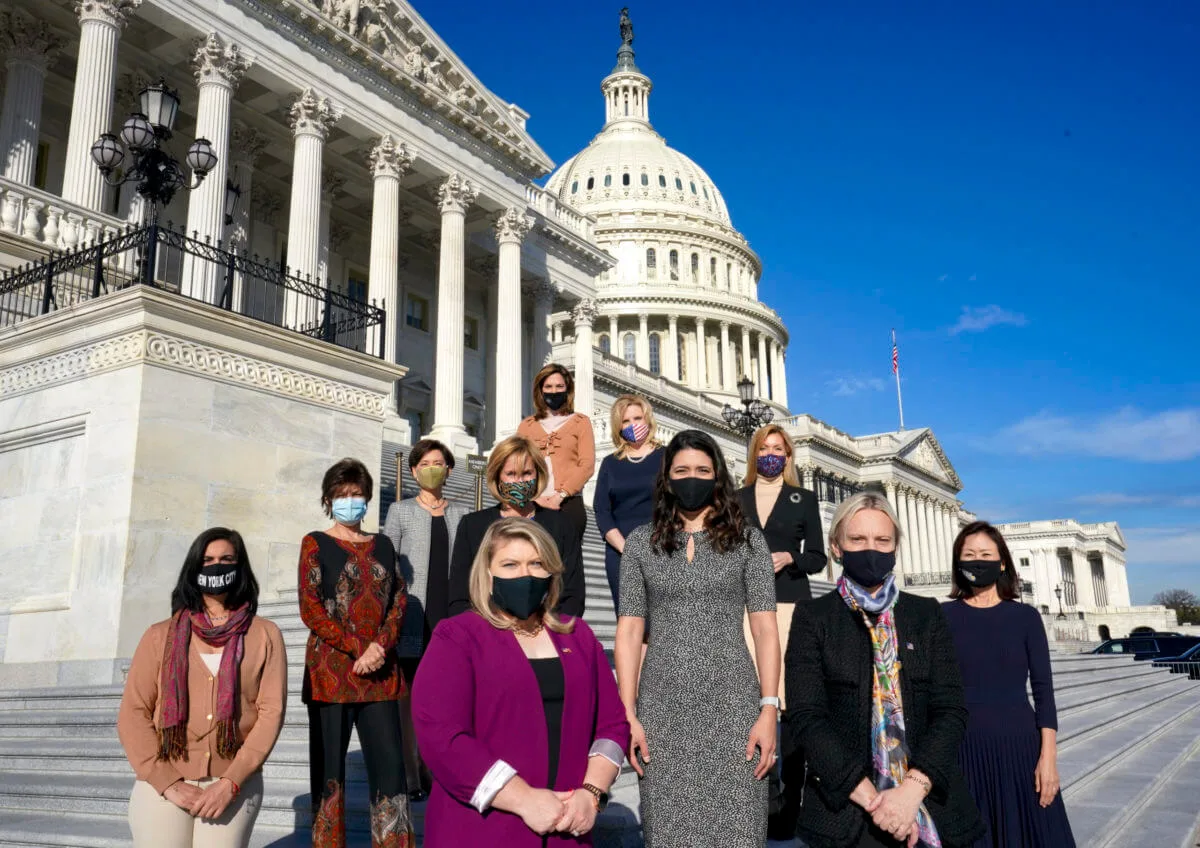
Incoming GOP congresswomen pose for a portrait outside the U.S. Capitol in Washington, District of Columbia, on December 3, 2020. From left, front line (six women): Nicole Malliotakis, Yvette Herrell, Kat Cammack, Stephanie Bice, Victoria Spartz and Michelle Park Steel. Rear row: Young Kim, Claudia Tenny, Maria Elvira Salazar, Ashley Hinson and Beth Van Duyne. (Photo by Bonnie Jo Mount/The Washington Post via Getty Images)
A surge of anti-abortion candidates won seats in the House, doubling the number of women lawmakers who oppose the right to choose from 13 to 30.
A record 141 women are set to serve in the 117th Congress, breaking 2019’s previous high of 127. The incoming group is somewhat diverse, including Florida’s Maria Elvira Salazar, who is Cuban-American; Stephanie Bice of Oklahoma, the first Iranian American in Congress, and New Mexico’s Yvette Herrell, a member of the Cherokee nation.
Despite this increase, reproductive rights advocates have cause to worry.
The three aforementioned representatives are part of a surge of anti-abortion candidates who won bids for seats in the House, doubling the number of women lawmakers who oppose the right to choose from 13 seats to 30. Republicans spent heavily on their campaigns and are branding this surge as a feminist win.
Sorting Fact From Fiction: Sign Up for COURIER’s newsletter.
In the last decade, states have passed more than 500 restrictions on reproductive rights. These new congresswomen will likely support more attacks on the federal level, despite abortion being protected by the 1973 Supreme Court ruling Roe v. Wade.
For example, earlier this month House Democrats held a historic meeting to discuss ending the Hyde Amendment, which bans federal funds from being used for abortion care. The move is supported by President-elect Joe Biden.
“Health care is a human right and every person has the right to have access to the same services,” said Dr. Jamila Perritt, president and CEO of Physicians for Reproductive Health, at the hearing. “They should not have to make decisions based on economics and income.”
The incoming crop of anti-abortion women lawmakers, however, are all but certain to join other Republicans in opposing the amendment’s repeal.
Limiting family planning options disproportionately harms people already facing healthcare obstacles, including Black, Indigenous, people of color, and people living in rural areas or with fewer financial resources.
Over the past four years, efforts to limit access have been high priority for Republicans. Last year, the Trump administration installed new regulations for the Title X grant program—the only federal program specifically dedicated to supporting family planning and ensures approximately 4 million low-income Americans have access to preventative care at low or no cost each year—that prevents providers from promoting or performing abortions. As a result, many providers left the program, which resulted in 800,000 fewer people getting care through Title X over the span of five months in 2019.
“The harm that has been done by the Trump administration—the harm that has impacted a lot of low-income and rural communities around access to basic family planning services—has been horrific,” Alexis McGill Johnson, the president of Planned Parenthood, told NPR.
Abortion advocates are expecting President-elect Biden to roll back many of Trump’s policies, but he will need the help of Congress to expand access to reproductive health care.
RELATED: How the Biden-Harris Administration Could Improve Reproductive Health on Day One
Nancy Mace defeated incumbent Joe Cunningham in South Carolina’s 1st congressional District. Mace, a sexual assault survivor, pledged on her website to “fight to protect victims of rape and incest,” but ostensibly not if they seek to terminate a resultant pregnancy. As a state representative, she repeatedly voted to block government funding of Planned Parenthood, voted in favor of an extreme fetal heartbeat bill in 2019, and sponsored anti-abortion legislation.
Georgia’s Marjorie Taylor Greene won the 14th congressional seat on an anti-abortion, anti-immigrant, anti-LGBTQ platform. Twisting the long-time pro-choice slogan, she tweeted “My body, my choice” to challenge the House mask rule in the first session of new member orientation, despite indisputable proof that masks save lives from COVID-19.
Florida’s Kat Cammack started a Faith and Pro-Life Coalition, garnering the support and votes of conservative Baptists, Methodists, Mormons, and Catholics in her district. “As a young, millennial, pro-life woman, I have the unique opportunity to engage with my generation and those younger on the importance of fighting for the unborn,” she told Christianity Today.
Legislation that diminishes people’s control over their bodies is not progressive, even when women themselves are the ones championing it. Pregnancy impacts every aspect of a person’s life, from workplace protections to domestic violence. Regardless of their gender, any lawmaker restricting access to safe, adequately funded family planning is restricting a person’s right to determine their own life circumstances.
“If you argue that women can be equal so long as they do not transgress laws that might throw them in jail for abortion, miscarriage, and pregnancy, then what you are arguing for is not equality, but submission,” Erin Matson wrote for Rewire News. “Central casting has always called on women, especially white women, to enforce the patriarchy. Don’t let them fool you.”
The newly elected Republican women are still outnumbered by their Democratic counterparts in the House 3 to 1. Three anti-abortion women also won re-election in the US Senate: Wyoming’s Cynthia Lummis, Iowa’s Joni Ernst, and West Virginia’s Shelley Moore Capito.
Georgia’s Kelly Loeffler, meanwhile, is locked in a tight runoff against pro-choice Democrat Rev. Raphael Warnock. During her first week in office in January—the Republican was appointed to finish out the term for retired Sen. Johnny Isakson—Loeffler put her name on three different anti-abortion measures.
READ MORE: Reproductive Justice Is on the Ballot in Georgia
Politics

Biden announces tariffs on Chinese Steel while visiting United Steelworkers members
“I'm president because of you guys. I really am and I'm proud. As was mentioned earlier, I'm proud to be the most pro-union president in American...

Opinion: Is Reproductive Healthcare just a women’s issue?
In this op-ed, Pennsylvania resident Lynn Strauss discusses the Republican Party’s conflicting stance on reproductive healthcare policy and the...

2 top US gun parts makers agree to temporarily halt sales in Pennsylvania
Philadelphia filed suit against Polymer80 and JSD Supply last year, accusing the manufacturers of perpetuating gun violence by manufacturing ghost...
Local News

Conjoined twins from Berks County die at age 62
Conjoined twins Lori and George Schappell, who pursued separate careers, interests and relationships during lives that defied medical expectations,...

Railroad agrees to $600 million settlement for fiery Ohio derailment, residents fear it’s not enough
Norfolk Southern has agreed to pay $600 million in a class-action lawsuit settlement for a fiery train derailment in February 2023 in eastern Ohio,...





